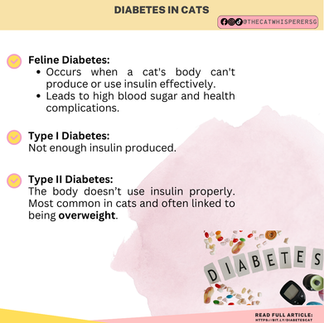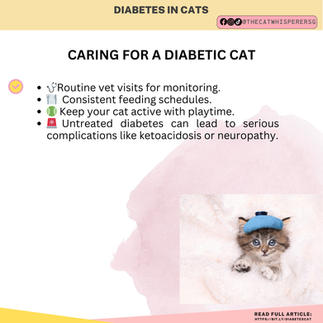
Diabetes isn’t just a human condition—our furry friends can get it too!
Diabetes in cats can be overwhelming at first, but with love, care and proper guidance from your vet, your cat can lead a happy and comfortable life.
What is Diabetes in Cats?
Feline diabetes occurs when a cat's body cannot effectively produce or respond to insulin, a hormone that regulates blood sugar levels. This leads to elevated glucose levels in the blood, causing symptoms that can significantly impact your cat’s quality of life if left untreated.
The normal blood glucose range for cats is typically between 3.8 and 8.1 mmol/L (or 70 to 145 mg/dL) when measured under non-stressful conditions.
There are two main types of diabetes in cats:
Type 1: The body doesn’t make enough insulin.
Type 2: The body doesn’t use insulin properly. Type 2 is the most common in cats and is often linked to being overweight.
What Causes Diabetes in Cats?
Some factors that can lead to diabetes include:
Obesity: Overweight cats have a higher risk.
Diet: Eating high-carb foods can contribute to weight gain and insulin issues.
Age: Older cats (over 7 years) are more likely to get diabetes.
Breed: Some breeds, like Burmese cats, are more prone.
Other Health Issues: Conditions like pancreatitis or long-term steroid use can also increase risk.
How to Test for Diabetes:
Blood Test: May be inaccurate because a cat's glucose level may be high due to stress. A urine test can be a quick way to detect potential diabetes if glucose is found. However, it should be followed up with blood tests for confirmation.
Fructosamine Test: This is a veterinary test that measures average blood sugar levels over the last two weeks and will not be affected by transient stress.
Symptoms to Watch For:
Early detection is key to managing diabetes in cats. Look out for these common signs:
Increased Thirst and Urination: Diabetes causes excessive sugar in the bloodstream, which draws water from the body.
Weight Loss Despite Increased Appetite: The body cannot utilize glucose properly, so your cat feels hungry but still loses weight.
Lethargy: Your cat may seem less playful or more sluggish.
Unkempt Coat: Diabetic cats often stop grooming themselves well.
Weakness in Hind (Back) Legs: This condition, known as diabetic neuropathy, occurs when high sugar levels affect the nerves.
If you notice these symptoms, take your cat to the vet right away.
How is Diabetes Treated?
If your cat is diagnosed with diabetes, don’t worry—it’s manageable! Here’s what treatment usually looks like:
Diet Change:
Many diabetic cats need a low-carb, high-protein diet to help control their blood sugar. Your cat will probably need to be on a prescribed diet.
Insulin Injections:
Most diabetic cats need daily insulin shots. It sounds scary at first, but your clinic should teach you how, and many owners find it gets easier with practice.
Weight Control:
Maintaining a healthy weight through portion control and regular feeding schedules can significantly improve your cat’s condition.
Blood Sugar Checks:
Regular glucose checks, either at home (using Libre or human glucose reader) or with your vet, are essential to ensure your cat’s treatment is effective.
Caring for a Diabetic Cat:
Managing diabetes requires commitment, but with the right care, many diabetic cats live long and fulfilling lives.
Here are some tips for long-term care and prevention:
Routine Vet Visits: Regular check-ups are crucial for monitoring your cat’s health. Your cat may need to do a regular blood sugar curve, i.e. monitoring their blood sugar level consistently over a number of hours.
Consistent Feeding Schedule: Maintaining a stable routine helps regulate blood sugar levels.
Keep Your Cat Active: Interactive playtime can help manage weight and improve insulin sensitivity.
Untreated or poorly managed diabetes can lead to serious conditions like ketoacidosis or neuropathy.
Prevention Tip: To reduce the risk of diabetes, keep your cat at a healthy weight, feed them a balanced diet and provide plenty of playtime.
Follow on Instagram: @thecatwhisperersg for more educational tips!













Comments